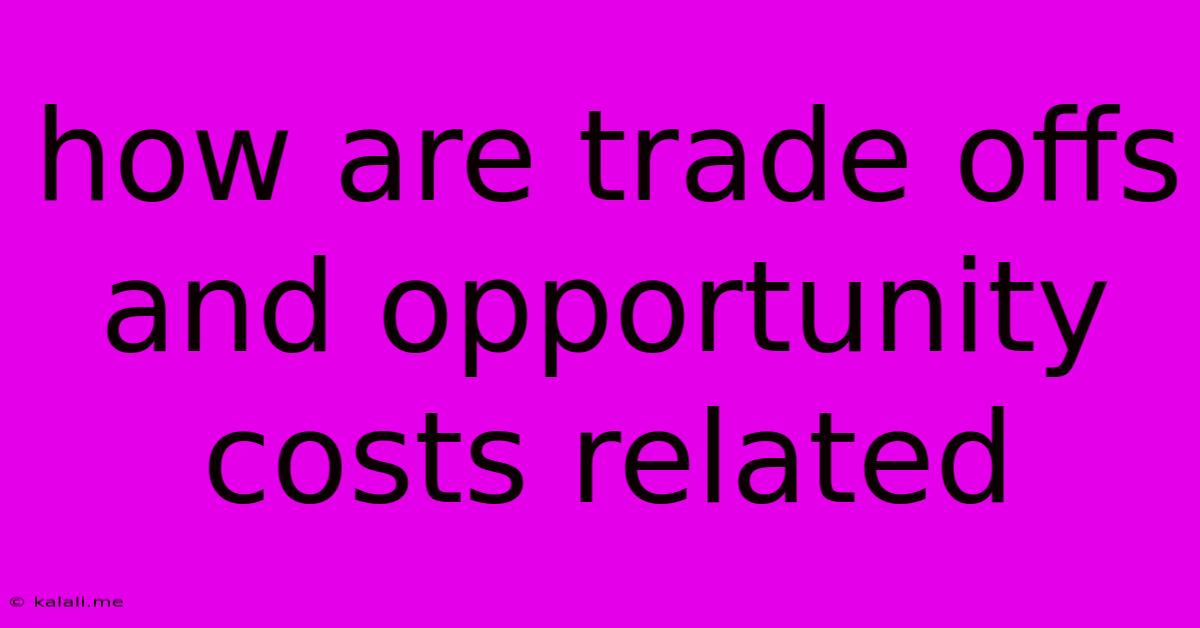How Are Trade-offs And Opportunity Costs Related
Kalali
Jun 14, 2025 · 3 min read

Table of Contents
Understanding the Intertwined Relationship Between Trade-offs and Opportunity Costs
Making decisions, whether personal or business-related, often involves choosing one option over another. This fundamental concept in economics highlights the close relationship between trade-offs and opportunity costs. While often used interchangeably, they represent distinct yet interconnected ideas crucial for effective decision-making. This article will explore the nuances of each concept and explain how they are intricately linked.
What is a Trade-off?
A trade-off represents a decision where you choose one option while forgoing others. It's a conscious choice to accept something in exchange for giving up something else. This involves weighing the pros and cons of different alternatives and accepting that you cannot have everything simultaneously. For example, a trade-off could involve choosing to spend more time studying (giving up leisure time) to achieve better grades. Another example might be a company deciding to invest more in research and development (giving up some short-term profits) to create innovative new products. The essence of a trade-off lies in the deliberate selection of one option, accepting the limitations imposed by the selection.
What is Opportunity Cost?
Opportunity cost is the value of the next best alternative forgone when making a decision. It's not simply the cost of the chosen option, but rather the potential benefit you missed out on by not choosing the alternative. Returning to the study example, the opportunity cost of studying is not just the money spent on books or tuition; it's the enjoyment or relaxation you could have experienced during the time spent studying. Similarly, for the company, the opportunity cost of increased R&D investment might be the potential profit they could have earned from using that money for marketing or expansion in existing markets. Opportunity cost forces you to consider the full spectrum of potential benefits and losses associated with a choice.
The Interplay Between Trade-offs and Opportunity Costs:
Trade-offs and opportunity costs are intrinsically linked. Every trade-off inherently involves an opportunity cost. When you make a trade-off, the opportunity cost represents the value of the best alternative you gave up. The act of choosing one option (the trade-off) automatically generates an opportunity cost, representing the value of what you didn't choose.
Let's illustrate this with another example: Imagine you have $10,000 to invest. You can either invest in stocks (potentially high returns but also high risk) or bonds (lower returns but lower risk).
- Trade-off: You choose to invest in stocks. This is your trade-off: you are choosing stocks over bonds.
- Opportunity Cost: The opportunity cost is the potential return you could have earned from investing in bonds, had you chosen that option instead.
Understanding the Importance:
Recognizing the relationship between trade-offs and opportunity costs is crucial for effective decision-making. By explicitly considering the opportunity cost, individuals and businesses can make more informed choices, ensuring that the benefits of their selected option outweigh the value of the forgone alternatives. This comprehensive approach leads to better resource allocation and maximizes overall value. Ignoring opportunity costs can lead to suboptimal decisions and potentially missed opportunities for growth or improved outcomes.
In conclusion, while distinct, trade-offs and opportunity costs are deeply interwoven. Every trade-off inherently comes with an opportunity cost, representing the value of the next best option sacrificed. Recognizing this relationship is fundamental for rational decision-making in both personal and professional contexts. By carefully weighing trade-offs and evaluating opportunity costs, you can make better choices that align with your goals and objectives.
Latest Posts
Latest Posts
-
Difference Between Starch And Glycogen Structure
Jun 14, 2025
-
Which Of The Following Is Not A Measure Of Dispersion
Jun 14, 2025
-
Heat Transfer In Liquids And Gases Takes Place By
Jun 14, 2025
-
All Of The Following Are The Determinants Of Demand Except
Jun 14, 2025
-
Which Of The Following Is An Advantage Of Product Departmentalization
Jun 14, 2025
Related Post
Thank you for visiting our website which covers about How Are Trade-offs And Opportunity Costs Related . We hope the information provided has been useful to you. Feel free to contact us if you have any questions or need further assistance. See you next time and don't miss to bookmark.